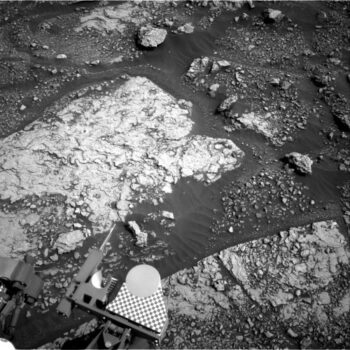
Drill target – Mary Anning. Curiosity Right B Navigation Camera image taken on Sol 2838, July 31, 2020.
Credit: NASA/JPL-Caltech
NASA’s Curiosity Mars rover is now performing Sol 2838 tasks.
“This past week, while Curiosity has been preparing to drill its next rock target, the Perseverance rover mission has been preparing to launch to Mars,” reports Melissa Rice, a planetary geologist at Western Washington University in Bellingham, Washington.
Due to a minor issue with the rover’s arm, the drill sequence for the Mary Anning target did not execute, Rice explains, but team members expect to see the new drill hole shortly.

Curiosity Front Hazard Avoidance Camera Left B image acquired on Sol 2838, July 31, 2020.
Credit: NASA/JPL-Caltech

Curiosity Front Hazard Avoidance Camera Left B image acquired on Sol 2838, July 31, 2020.
Credit: NASA/JPL-Caltech

Curiosity Front Hazard Avoidance Camera Left B image acquired on Sol 2838, July 31, 2020.
Credit: NASA/JPL-Caltech
Re-do drill activities
“Perhaps Curiosity is just a humble, conscientious rover that did not want to steal any glory from Perseverance on its launch day,” Rice adds.
For sol 2838, the re-do of the drill activities will use most of Curiosity’s available resources, Rice adds, but there is also some time available for atmospheric monitoring activities.
“These will include a Mastcam observation of the sky to observe the high levels of dust that are expected in this season on Mars. Looking up seems like the appropriate thing to on this day, as Perseverance starts hurtling towards Mars’ skies,” Rice reports.
Launch reflections
“I have been reflecting this week about Curiosity’s launch, which was nearly nine years ago now, but still feels as vivid in my memory as yesterday. I was lucky enough to witness that launch in from the Kennedy Space Center in Florida with the Mars Science Laboratory team – I was just a graduate student at the time,” Rice notes.
“While I had only recently started collaborating on the mission, Rice says, “many of the colleagues surrounding me on the bleachers had been working tirelessly to design, build and test Curiosity for nearly a decade.”
Skyscraper full of explosives
“Imagine devoting so many years of your career to a project, and then strapping your delicate creation to a skyscraper full of explosives and pointing it towards the sky…that’s essentially what a spacecraft launch is!”
There was a palpable tension leading up to the final countdown, Rice recalls. There was pin-drop silence as the clock reached zero. “I was completely shocked at just how loud it was during liftoff. The Atlas V rocket seemed to shake the whole Earth, and I felt the sound hit my chest like a wall.”

Curiosity Mars Hand Lens Imager photo produced on Sol 2838, July 31, 2020.
Credit: NASA/JPL-Caltech/MSSS
Sensory overload
“But even more noise came from the screaming mass of scientists and engineers surrounding me,” Rice says, “who were clapping, yelling, jumping and hugging. I tried to keep my eyes on Curiosity for as long as I could, but several times I had to look away because the flames were too bright – it felt like I was staring directly at the Sun. That sensory overload just doesn’t come across when you watch a rocket launch on TV.”
For their launch, the Perseverance team stayed home to keep each other safe during the present pandemic, Rice adds, “and they watched the launch from many hundreds of individual screens. But their excitement was no less than what we felt in November 2011 – and their screams at liftoff, following that tense silence beforehand, reverberated through living rooms across the globe.”
Rice concludes: “Safe travels, Perseverance! We can’t wait for you to join us on Mars!”



